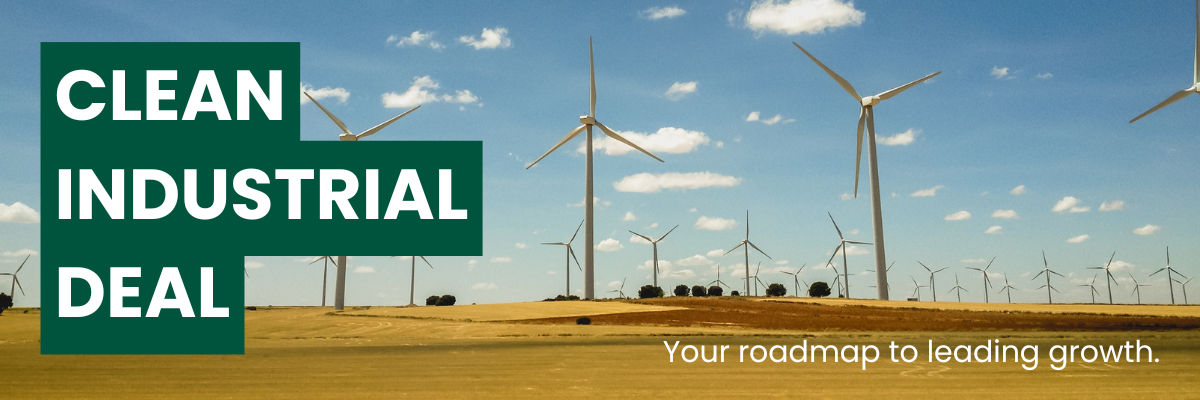
Written by Martijn Meijer
Dear reader,
Welcome to a new edition of our monthly Energy & Climate Policy Update. This time around, we delve deeper into the implementation of the Critical Raw Materials Act after the European Commission announced a first set of strategic projects under the act last month. In our Clean Industrial Deal section, we outline the Industrial Decarbonisation Accelerator Act, the consultation for which opened last week.
Europe’s bold plan for sustainable growth, the “Clean Industrial Deal”, represents a major shift for EU businesses, especially in energy-intensive sectors. Don’t miss your chance to engage with the Commission to shape this deal and influence the policy direction for the next five years.

The spotlight
The implementation of the Critical Raw Materials act
On 24 March, the European Commission announced the first 47 strategic projects under the Critical Raw Materials Act (CRMA). These projects, spread across the EU, are meant to boost the extraction, processing and recycling of strategic raw materials to help reach the targets set in the CRMA. By being designated strategic, these projects will benefit from streamlined permitting, reducing the procedures by several years, and extra financing.
What does this mean for the implementation of the CRMA and what is to come? Continue reading this month’s Spotlight to find out!
What is the CRMA again exactly?
The CRMA, which entered into force on 3 May 2024 is meant to address the worries about Europe’s strategic autonomy with regards to raw materials. The EU is highly dependent on non-EU countries, especially China, for the mining and processing of critical raw materials (CRMs) such as lithium and boron.
With the CRMA, the Commission seeks to create a domestic supply of raw materials by improving the business environment in the sector. To this end, the law sets targets for the mining, processing and recycling of CRMs in Europe for 2030, with 10% of annual consumption coming from local extraction, 40% of consumption processed within the Union and 25% coming from recycled materials. A further limit of sourcing 65% of annual consumption of a single material from a single third country is also targeted in order to diversity the supply chains.
The CRMA also aims to shorten the permitting process for mining and processing plants. With the CRMA, the European Commission can name certain projects as strategic, allowing for streamlined permitting and access to financing, including possible state funds. Under the act:
- Strategic mining projects will have to receive permits within a maximum of 27 months and processing and recycling facilities will receive them in a maximum of 15 months, compared to a possible five to 10 years for mining projects according to standard timelines.
- Potential strategic stockpiles are introduced, by first requiring Member States to report existing stocks before deciding on the needed levels of any EU-wide stockpiles.
- Critical minerals producers and sellers in the bloc will be required to display the environmental footprint of their products, to allow potential customers to make an informed and sustainable choice.
The new 47 projects
On March 25th 2025, the Commission published the first list of projects under the CRMA. These 47 Strategic Projects are based in 13 Member States and cover 14 out of the 17 SRMs. They span the full raw material value chain: 25 projects involve extraction, while 24 focus on processing, 10 on recycling, and 2 on the substitution of raw materials. The projects include a particular attention to lithium (22 projects), nickel (12), cobalt (10), manganese (7), and graphite (11), all of which are all essential raw materials for the EU’s battery value chain.
The strategic projects should help the EU to fully meet its 2030 extraction, processing and recycling targets for lithium and cobalt, while making significant headway on other key materials. In addition, projects focused on magnesium and tungsten are set to strengthen supply chains vital to the defence sector. The projects will be given a total investment of €22.5 billion and will be supported by the EU and the Member States in becoming operational. On top of that they will benefit from the streamlined permitting procedures.
Whilst the projects are spread over 13 Member States, that does leave out half the EU from investments in this key sector. Vice-President of the S&D group Mohammed Chahim regretted the lack of projects in the Netherlands, noting the importance of critical raw materials for the Dutch electric car industry and the wind farms in the North Sea.
Next steps in the CRMA
The Commission will publish a second list of strategic projects in the summer of 2025, increasing the future supply of CRMs in Europe. The implementation of the Action Plan for Affordable Energy and the Clean Industrial Deal over the course of 2025 will aid in the efforts by increasing the competitiveness of European industry and lowering energy prices, allowing for a better business case for recycling and processing. Meanwhile, the Circular Economy Act, to be published in 2026, should support the recycling targets over the second half of the CRMA timeline.
Interested in exploring how the CRMA measures might impact your business and what other opportunities CRMA implementation might offer? Let us help you get in contact with key stakeholders in Brussels. Contact us now via eu@publyon.com.

Impact analysis for your business
Our free policy updates keep you informed, but is that enough? With our tailored EU Energy & Climate Policy Update you’ll receive:
- Custom insights on how upcoming policy changes might impact your business;
- Strategic advice from your dedicated policy consultant on how to turn challenges into opportunities;
- Early warnings about key legislative developments.

Policy updates
IMO approves new regulations to decarbonise shipping
On 11 April, the International Maritime Organisation (IMO) approved the world’s first sector-wide framework combining fuel standards and carbon pricing to cut shipping emissions and reach net-zero by 2050. Starting in 2027, large vessels must meet stricter fuel intensity targets or purchase remedial units. A new IMO Net-Zero Fund will channel emissions revenues into clean fuel innovation, support for developing nations, and fair transition efforts. While operational costs for transport via shipping may rise, a global approach ensures a level playing field for shipping worldwide. The European Commission has expressed its support for the agreement.
EU’s 2040 climate goal under fire
As political pressure mounts, European Commissioner for Climate, Net Zero and Clean Growth Wopke Hoekstra is considering ways to water down the EU’s proposed 90% emissions reduction target for 2040. Options include slower early reductions, using international carbon credits, counting forest carbon capture, and adjusting sector targets. Critics warn these “flexibilities” risk turning into loopholes, delaying real cuts and thus making it even more difficult to reach net-zero by 2050.
EU ETS has successfully halved emissions since 2005, says Commission
According to a new study by the European Commission, the EU Emissions Trading System (EU ETS) has halved emissions since 2005, with a 5% drop in 2024 alone. The power sector led the way, cutting emissions by 12% thanks to strong growth in solar and hydropower. Industry emissions stayed stable, aviation rose by 15%, and shipping joined the ETS for the first time and will be reported once data collection is completed.
New German coalition deal unveils massive investment plan
Exactly 45 days after Germany’s federal elections, coalition talks between the CDU/CSU and SPD concluded on 9 April. The coalition agreement outlines key energy and climate initiatives, including the launch of the €10 billion Deutschlandfonds, designed to attract over €100 billion in private investment for scale-ups and climate infrastructure. The government also plans major investments in hydrogen, carbon management, renewables, and energy grid infrastructure. Another interesting point is the coalition’s decision to reverse the latest increase in aviation taxes to support industry competitiveness.
EU institutions reach agreement on Soil Monitoring Directive
On 10 April, the Council of the EU and the European Parliament reached a provisional agreement on the Soil Monitoring Directive. It aims to improve soil health across the EU, with a non-binding goal of achieving healthy soils by 2050. Member States will be responsible for monitoring and setting sustainable objectives, using a common EU framework with shared soil descriptors to assess soil health. While a new EU-wide methodology will be introduced, countries can build on existing national systems, giving them flexibility in implementation. The agreement now awaits final approval.

Clean Industrial Deal
A closer look at the Industrial Decarbonisation Accelerator Act
To safeguard Europe’s industrial base, President of the European Commission Ursula von der Leyen in February presented the Clean Industrial Deal (CID) as the EU’s new overarching growth strategy. Today, we delve deeper into one of the flagship measures announced as part of the CID, the Industrial Decarbonisation Accelerator Act, to be presented by the Commission in Q4 2025.
The Industrial Decarbonisation Accelerator Act as a game changer
As a legislative binding measure, the CID will introduce the Industrial Decarbonisation Accelerator Act in Q4 2025. It’s with the Commission having opened a public consultation last week, we now know more about the act. Its objective is threefold:
- Accelerate permitting procedures: Lengthy permit-granting procedures for decarbonisation projects – often tied to access to energy infrastructure – pose a significant challenge for energy-intensive industries (EIIs) aiming to reduce their emissions. The Act is expected to simplify and accelerate these permitting processes for clean tech initiatives, including electricity, hydrogen, and carbon capture infrastructure.
- Prioritising clean tech projects and clusters: The technologies needed to decarbonise EIIs are often not yet cost-competitive, largely due to high capital and operational costs, long payback periods, and limited large-scale deployment. Given the high risks and expenses involved, public support is crucial to help de-risk these investments. The Act is expected to identify priority decarbonisation projects and industrial clusters, and to ensure they receive the necessary policy backing and financial support.
- Establishing European lead markets: Under the motto “Europe should lead, not follow” the Commission seeks to introduce policy options to establish European lead markets for low-carbon products, such as:
-
- Sustainability and resilience criteria and minimum EU content requirements in public (and in some circumstances, private) procurement in strategic sectors.
- A (voluntary) EU label to promote industrial products with a low carbon intensity.
- Measures for uptake of clean carbon feedstock, including carbon capture and utilisation, sustainable biomass and recycled waste.
- Measures to boost the single market benefits of (foreign direct) investment in innovative technologies.
What does this mean for your business?
The Industrial Decarbonisation Accelerator Act is set to play a key role in removing regulatory barriers, simplifying procedures, and stimulating demand for resilient, low-carbon industrial products. While the formal proposal will only be presented at the end of 2025, input can already be given. The public consultation and impact assessment, in which the Commission assesses different policy options, is open until July. Your time to act is now.
If you would like to know more about how to submit your input on the Industrial Decarbonisation Accelerator Act, do not hesitate to contact us via eu@publyon.com.

Blog
EU’s Clean Tech: not just a policy shift, it’s a new industrial era
Explore our latest blog post on how Europe is entering a new era of industrial transformation, with clean technologies at the heart of its economic and environmental strategy.
READ MORE





